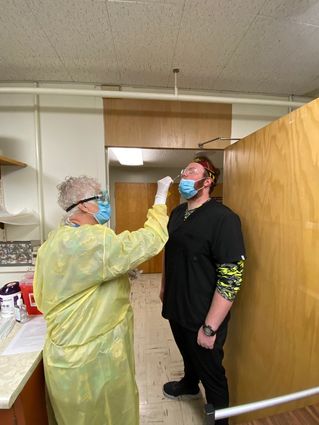Failing the test
Rapid result COVID-19 testing strips hard to come by for nursing homes
September 10, 2020

SUBMITTED PHOTO
Community Memorial Health Center Director of Nursing Susie Stanley swabs the nose of C.N.A. Pierce Van Sloten during a COVID-19 test this week. The Hartley facility is having a hard time finding more rapid testing strips to adhere to federal testing rules.
A shortage of COVID-19 testing material has officials at Community Memorial Health Center worried the facility will soon fall out of compliance with federal guidelines.
CMHC recently received a rapid coronavirus-testing machine from the federal government to quickly test staff and monitor potential infections. However, since O'Brien County's COVID-19 positivity rate is more than 10 percent of those tested, staff must be scanned once a week with a 48-hour turnaround for results. CMHC's original bundle of 240 rapid testing strips quickly depleted, and the facility was slated to run out this week.
CMHC Administrator Janette Simon said finding more rapid test strips was like trying to find water on the moon.
"Even if I could find them to order, they cost $1,000 for 30 strips," she said. "Under the current parameters, it will cost us $6,000 [to test staff] per week and if we have an outbreak, we'll have to test the residents at a cost of $12,000 per week. This will financially ruin most care centers."
The testing standards for long-term care facilities were issued by the Centers for Medicare & Medicaid Services (CMS). According to the federal agency's protocol, a facility must have documentation of its efforts to obtain quick turnaround test results if it cannot achieve the 48-hour window.
Facilities that don't test according to the rules get fined $1,000 for the first day and $500 every day thereafter. To make a good-faith effort, Simon has been in contact with companies in Colorado and North Carolina, both of which said they could test staff and deliver results that meet the deadline; however, it would cost around $130 per test.
"There's no hope for that," Simon said.
Simon has also been in contact with the state hygienic lab in Iowa City. The facility could run the test results for CMHC's staff, but results wouldn't meet the 48-hour turnaround deadline.
"The only thing we can really do is make a good faith effort and stay in compliance with CMS guidelines," Simon said. "All we can do is keep doing what we're doing."
Simon said she has "written every legislator and agency known to man" to share CMHC's plight. So far she has only heard back from Iowa District 2 Sen. Randy Feenstra, who said he was working with CMS and the department of health to relax the law and bypass fines.
Simon believed the shortage of rapid testing strips has been exacerbated by larger metro-area facilities hoarding them, which has led to price gouging. She feared the trickle-down effect could ravage smaller facilities like CMHC.
"Little Hartley in little O'Brien County, Iowa doesn't have those resources [like bigger locations], but we're still subjected to the same fines," she said.
CMHC staff and residents have remained coronavirus-free during the pandemic, which is a point of great pride for Simon. She credited her staff for making sacrifices outside of work to keep residents healthy.
"It says a lot about their commitment to keeping them safe," Simon said. "Following protocols is taking a lot more emotional toll than they were at first, but we have to stay strong so we don't get lax and invite COVID inside our building."

NICK PEDLEY/SENTINEL-NEWS
CMHC Administrator Janette Simon has been proud of how her staff has handled the pandemic.
Simon hoped the general public would acknowledge that more needs to be done to control the virus' spread and keep positivity rates low. Since the elderly are more susceptible to coronavirus-related complications and death, Simon and her staff will have to uphold strict protocol until a vaccine is released.
Simon urged the general public to follow proven CDC guidelines to control the spread and was critical of state leaders for not doing more to reduce infection rates.
"This will continue to be a problem for us in the nursing homes until the greater community stops the spread of COVID," she said. "We have laws about wearing seatbelts because we won't do it on our own; we have laws about not smoking in public spaces because we won't do it on own. It's time to see some leadership from those people without being afraid of hurting their popularity."





